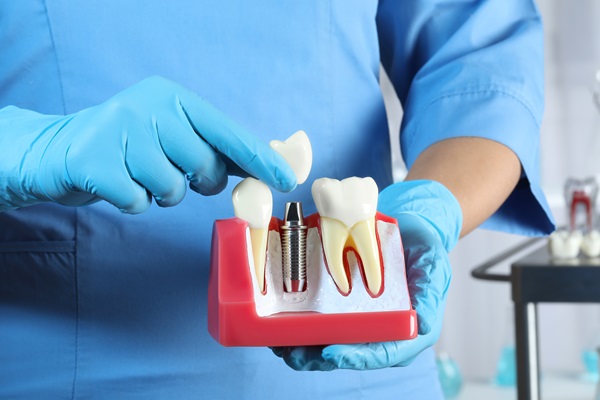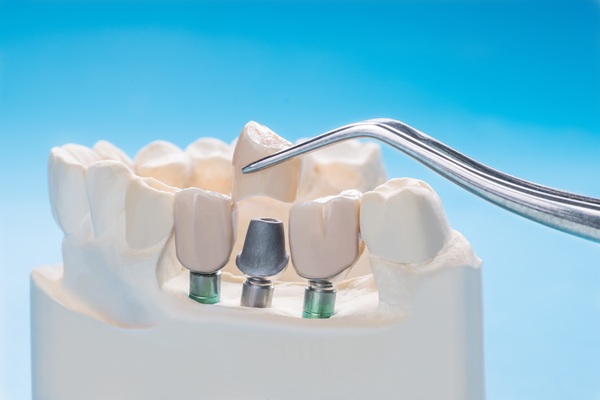A Guide To The Dental Implant Restoration Process

A dental implant restoration is a method of teeth replacement that offers long-term durability and a natural feel and function for patients. It involves the placement of a dental implant (a titanium dental post) into the jawbone, followed by attaching the abutment and prosthetic (crown, bridge or denture).
How the dental implant restoration process works
The dental implant restoration process involves a consultation visit o discuss treatment, preparing the mouth for implant placement, the placement procedure and finally the abutment and implant restoration placement. The following is a review of each step involved with dental implant restoration.
Consultation and preparing for implant placement
The consultation visit for dental implants involves a review of the patient’s previous medical history and dental history, going over all available treatment options and putting together a treatment plan. During the visit, the dentist conducts a thorough oral examination and studies dental X-rays to determine if a bone graft procedure (or any other dental treatments) are necessary before implant placement. If necessary, a bone graft procedure date is built into the treatment plan, and this step takes place before the implants are placed into the jawbone. Some patients also require periodontal disease treatment as well.
Implant placement and the recovery process
Implant placement involves accessing the underlying bone that supports the tooth through a minor surgical procedure. The dentist then places the titanium posts (implants) into the jawbone. It is a safe procedure with little risks, but there is a recovery process that is required for the mouth to fully heal.
Many patients are able to return to a normal routine within two weeks after the surgery. In the meantime, the patient should stick to a diet of soft foods and drink water throughout the day to keep the mouth clean, along with following all oral care recommendations provided by the dentist and their staff.
Placement of the abutment and dental implant restoration
After the mouth heals, the next step in the process is to place the abutment and the dental implant restoration. The dental implant restoration could be one of several options, depending on the number of teeth that are being replaced. For single tooth replacement, a dental crown is commonly used, whereas a dental bridge (partial denture) or complete denture is used to fill in a section of missing teeth or an entire row.
Dental implant repairs and long-term care
A dental implant restoration can last for more than 25 years if it is cared for properly, and most last for at least 15 years. Patients can care for them the same as they would natural teeth, which involves brushing, flossing and using mouthwash regularly. If the dental implant is damaged, the dentist can either repair it or replace it, although damage is relatively rare.
Schedule a dental implant consultation today
The first step in the dental implant restoration process is a consultation visit. If you are interested in replacing missing teeth, contact our team by phone or email today to arrange a time for a visit.
Request an appointment here: https://www.roswelldentalsmiles.com or call Roswell Dental Smiles at (770) 238-1209 for an appointment in our Roswell office.
Check out what others are saying about our dental services on Yelp: Dental Implant Restoration in Roswell, GA.
Recent Posts
If you have dental issues that have made you less confident in your smile, you should consider consulting with a restorative dentist. The dentist will evaluate your smile and let you know how to restore the look of your teeth and, ultimately, your confidence in your smile. Continue reading to find out what restorative dental…
Unlike general dentistry, which focuses on routine examinations and treatment, restorative dentistry is a specialization focusing on the repair or replacement of damaged or missing teeth. Bruxism is a fairly common condition that causes the clenching and grinding of teeth. While no single cause exists for bruxism, the results of teeth grinding are well documented.…
If you want to improve your smile’s appearance, a smile makeover is a way to go. It is advisable to prepare adequately for this procedure because it increases the desired outcome. Since there are many makeover choices, it is better to take the dentist’s advice and work with the treatment plan that they recommend.The procedures…
Getting the right smile makeover is a form of dental rescue for your eroded enamel. It can be annoying at first, but without treatment, it can be a serious dental issue. Among the causes of tooth or enamel erosion, drinking soda is the most damaging. Drinking such sugary and acidic beverages can wear down your…


